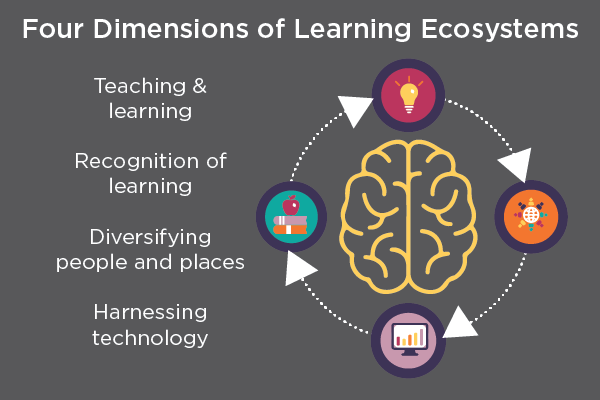From May 17-20, leading thinkers on education system transformation convened under the banner of the Global Education Leaders Partnership. While the meeting was originally scheduled to be hosted at the Brookings Institution in Washington, DC, because of the coronavirus pandemic, participants instead collaborated over a period of 12 hours of Zoom sessions co-facilitated by NCEE’s President and CEO Anthony Mackay.
Participants shared a unified goal of transforming education to create broad learning ecosystems that meet the challenges posed by an uncertain future, one in which globalization, artificial intelligence and related technologies will change the ways that students learn, the jobs available to workers, and the ways citizens engage in their society. They also agreed that education transformation would take place in four dimensions: teaching and learning; recognition of learning; diversifying people and places; and harnessing technology. But they presented a wide range of strategies to realize that vision, from policy approaches to pilot community programs to new applications of machine learning.

NCEE was invited to discuss our work with the Organisation for Economic Co-operation and Development to convene six leading jurisdictions in a collaboration called High-Performing Systems for Tomorrow. These leaders meet twice per year to consider the implications of artificial intelligence and related global trends for what students need to know, how and where they learn, and the teaching profession, as well as how systems can transform to meet the challenges of an AI world. Many other leading organizations shared their cutting-edge work in different areas: rethinking learning environments both inside and outside of the classroom; harnessing digital tools to meet the needs of all learners; breaking down the barriers between schools and community resources to support learners beyond the school; and reshaping the roles of teachers and parents, especially during a challenging few months of distance learning.
Several themes emerged that reinforced the importance of NCEE’s work in the US. The coronavirus pandemic has exposed the deep and enduring inequalities underpinning our education system, yet it also represents a real opportunity – perhaps an imperative – to redesign education to equitably meet the needs of all our students. In order to meet that challenge, we must continue to benchmark the world’s leading education systems. Policymakers need to develop a strong and supportive policy infrastructure that enables all students to achieve at world-class levels with equity – and also enables innovations to develop and spread. And all levels of the system need innovative and strategic leaders who can set a bold and equitable vision for education and build broad support to execute that vision.
A report of the proceedings and a list of participating organizations will be available in the next few weeks, and we look forward to sharing it with our readers.




